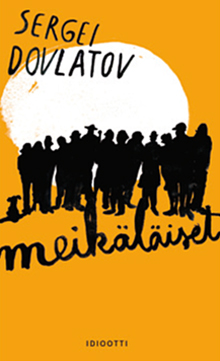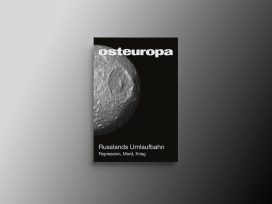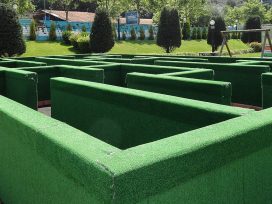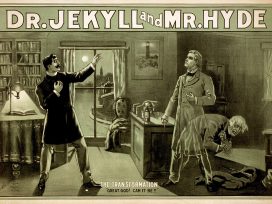In the Soviet Union I was not a dissident. (Being a drunk doesn’t count.) All I did was write stories that were ideological strangers. And I had to leave. It was in America that I became a dissident.
Sergei Dovlatov
The great man and the small man

Central to the primary meaning of a work of art is the person of the artist, especially if the work contains autobiographical material. Sergei Dovlatov (1941-1990) is a special case in this respect. The writer Dovlatov, and his character Dovlatov, are as dependent on one another as the two hands simultaneously drawing one another in Maurits Cornelis Escher’s mysterious drawing. This interdependence doesn’t imply anything definite about their identity, however. Those who knew Dovlatov from his works merely imagined they knew the man. Those who knew him personally realized they didn’t know him very well. The facts of his biography are all blurred, ambiguous, vague. This should be kept in mind when reading his books. Almost confessionary in form, their content is largely invented. As a great mystifier, he was able to unsettle his surroundings. In the field of gravitation surrounding Dovlatov, reality is distorted and loses its plausibility.
But before focusing on the man himself, we should decide on our criteria. The pathos typical of world literature can be seen as a defence of the human being. How do we evaluate a person? Every one of us has a scale according to which we weigh the social significance of a person. This scale runs between two generalizing definitions, namely “the great man” and “the small man”. The megalomania inherent in Russian autocratic rule would acknowledge only statesmen-heroes as great men. Therefore Tsarist censorship was nettled by the entirely inappropriate respect shown for the person of Pushkin in his obituary: what value could there be in a poet, let alone one who, instead of praising absolute power, endorsed mercy toward the fallen? As for the place of the human being in Russian reality, government and society were far from seeing eye-to-eye. Russian literature turned its face from the mighty of this world and gave its heart to the poor, the luckless, penniless outsiders, whom it saw through the magic crystal of art. They were seen as true, genuine people, whereas the lords of life proved to be the charlatans of existence.
The central character in Sergei Dovlatov’s prose, the author’s alter ego, is a small person. A small man in a great country built by dwarfs. Here is the first confusing point: a great small person. It is a common view that the pathos at the root of Dovlatov’s work is a tolerance for human weaknesses, but this is not exactly the case. It is more correct to see in the author a certain cruelty justified by his conclusions. Dovlatov’s sarcasm scratches away at the encrustation of context, setting man free from the wretchedness of everyday life. But his all-engulfing satire shows none of an author’s self-conceit. Basing his literary experiments on his own person, he cannot be blamed for snobbism.
The great small man is an oxymoron, a contradiction in terms, and indeed Dovlatov was something of an oxymoron himself, a huge walking contradiction. Physically big, but inside… not what he appeared to be. Uncertain of himself, yet full of himself. Arousing fierce opposition yet radiating a dour charm. Half Jewish, half Armenian by birth, Sergei Donatovich Dovlatov had more right to represent Russian literature at the level of global civil society than anyone else. And at this highest of levels he is unique. He is an independent thinker without a cause. A dissident without an idea. He managed to merge intellectualism with bohemianism, and life gave him a hard schooling – but he never learnt to live outside the sphere of literature. He was no macho, rather a bear; overwhelming physicality was an expression used by Joseph Brodsky to characterize him. In the bohemian literary circles of Leningrad, Dovlatov was a phenomenon. He also became one in the Russian diaspora of New York. His physical frame enthralled women, and in men his appearance aroused respect. His friendships were neither lasting nor dependable. His love affairs were mindless and unhappy. According to Valery Popov, a long-standing friend, he was touchy, suspicious, apprehensive – and cruel, deceitful and quarrelsome. A true intellectual, he was irresistible and unbearable all at once. Oh, for all those kind-hearted evil deeds that formed the canvas of his biography upon which his words wove literature… With its syncopated rhythm, his life’s chronicle resembles a jazz composition. While valuing friendship, he was utterly merciless even to his nearest and dearest. He loved women, but his love stories were tragi-comic. He would marry when a relationship was beginning to fall apart, and women gave birth to children of his after totally breaking up with him.
Dovlatov came from a background of artists: his father Donat Mechik was a theatre director, his mother Nora Dovlatova an actress. Sergei was also an artist by nature, but took his time to choose his field. Nor did life give him a chance to do otherwise. He was born on 3 September 1941 in the town of Ufa, where the family had been evacuated at the beginning of the war. The years of his boyhood and youth were spent in Leningrad. At school he made no particular impression, apart from his physical stature and charm. Lacking both outstanding talent and a careerist intelligence, he chose the humanities for his field and enrolled at the Finnish department of the philological faculty of the Leningrad State University. It was during these years that he became familiar with the underground literature of Leningrad. A passionate interest in Hemingway and a close acquaintance with Brodsky were what decided his fate: he wanted to become a writer. After this, he lost interest in the foreign language he was studying and dropped out of university.
Dovlatov’s reckless way of life might have landed him in prison, but instead, he found himself in the army. After three years’ service he returned to Leningrad and set out to try to become a professional writer. He worked as a journalist and as an editor for several publishers. He wrote news reports and travel stories for various papers. But he failed to enter the privileged group of established authors. He was plagued by a feeling of helplessness and hopelessness. He set off to look for new opportunities in Estonia, a Soviet state of a slightly different character, hoping to find more freedom there. For anyone with a more ordinary view of life, this slightly less restricted existence might indeed have sufficed, but for a great author it remained painfully limited. In Tallinn, Dovlatov almost managed to publish a collection of short stories, but in the end, the chance came to nothing. The organs of state would not loosen their grasp of the rebel. Dovlatov returned to Leningrad, as to a familiar house where he’d already run his head against every wall looking for a way out. Losing every hope of finding a job in Soviet reality, he set out to be a tour guide at the Pushkin museum reserve at Mikhailovskoye.
The tale of Dovlatov’s sufferings becomes an ironic chronicle of his times. Later, in America, the Ardis publishing house published his first book, aptly named Nevidimaya Kniga (1977), The Invisible Book (1979); in his own country, he had only been seen by those whose duty it was to see everything. The organs of state undertook to take care of his fate. After Solzhenitsyn and Brodsky, Dovlatov too was sentenced, but his vanity was wounded by the sentence being merely for hooliganism – an outrageous gesture, he felt. After the sentence, with reproaches and threats ringing in his ears, he decided to leave his home country.
In the United States, the career of this Russian author turned out optimally. He was translated and published in the most prestigious papers. His works were read in Russian immigrant circles, and his radio performances were listened to in his native country. Was he happy? No. “God gave me what I’ve been asking for my entire life. He made me a normal writer. Having become one, I saw I wanted more, but it was too late. You cannot ask God for more”, he wrote.
Dovlatov was mistaken. God gave him more than he’d asked for, more than he’d hoped. Out of the will of the Highest or out of luck or chance, he rose from being a run-of-the-mill writer to join the constellation of classic Russian authors. Among his own generation, he became a charismatic authority and the darling of readers. This came about through democratic election by his readership, as it were. How is this to be explained? The reality oppressing us all is endowed by Dovlatov with a missing dimension – the fact that the small man can rise above himself and grow to his full stature.
The superfluous and ridiculous man
A human being’s greatest problem is that his destiny does not match his inherent nature. Which is worse? To be faced with a situation beyond one’s powers, or to be constricted and suppressed by circumstances? Not finding one’s place in life is tragic… or comical. He who makes a mess of his life is a ridiculous person.
The gallery of superfluous people in Russian literature is full of well-known figures. What terrible suffering have Onegin, Petshorin and other heroes of our time undergone because of their intelligence! An attitude of pathos in relation to reality, however, casts a shadow of the grotesque. The ridiculous person brought into our literature in the form of a character created by Gogol became the comical negative of the tragic hero. The crowning madness of our life is the dream of a ridiculous man (which is the title of a story by Dostoyevsky): a dream seen with waking eyes. Dovlatov’s story Solo na Undervude (1980, “Solo for an Underwood” [as in, an Underwood typewriter]) questions in passing how much time it takes for the theme of the superfluous man to reveal itself; a lifetime, the answer turns out to be. Dovlatov’s innovation is to connect two archetypes of classic Russian literature, two worn clichés: that of the superfluous man and the ridiculous man. These two coexist in one and the same person. In every Don Quixote he sees a Sancho Panza, and vice versa.
The object of Dovlatov’s satirical eye is himself, an author superfluous in the literary field, a figure presented to readers for laughs. He is an Alitonov, a Dalmatov and a Koshits. His own character is mythologized and mystified, so much so that the question arises: was it Dovlatov after all? Or was Dovlatov dreamed up by his characters? Such a radical refusal of an author’s primariness is nowhere to be found among the great authors. Particularly not those who have worked on their autobiographies. True, with Dovlatov, distinguishing between genres seems strained. One might say the books he published were not finished works but preparatory material for a magnum opus that he never meant to write, yet did write after all. The reader compiles this final work from various fragments and this is why, reading Dovlatov, one experiences the pleasure of joining him in his creative work.
Dovlatov’s artistic method can with good reason be labelled realism. The reality of the text is presented, criticized and edited, but drawing conclusions is not to be recommended. There are no conclusions to be drawn from reality. Neither is there a way out of it. Life lacks a plot. The main feature of Dovlatov’s prose style is not its simplicity, as has sometimes been claimed, but its precision and clarity. His prose, seemingly flabby and disorganized, is actually refined down to the very last comma. The form of the stories is inconspicuous, and as such it messes with the content. It is like good vodka in a clear glass becoming invisible as it concentrates on its deepest character. (Dovlatov, however, who tends to find metaphors deceptive and therefore to avoid them, would hardly have found this image acceptable.) His prose style is characterized by fabulism, ease, syntactical completeness. His form shows traces of marginal types of folklore, of anecdotes and bylinas. He used his stylistic palette to such perfection that eye witnesses of events described by him began to doubt their own memories. The story of novelist Andrei Bitov giving poet Andrei Voznesensky a bashing was one that neither of them was able to refute, although they both swore nothing of the kind had ever happened.
Dovlatov had many great forerunners. Petronius. Rabelais. Gogol. Harms. There are two ways of relating the absurd: negative and positive. Dovlatov – the character through whom we see Dovlatov – is an illegitimate scion of the Good Soldier Svejk: he overcomes the consequences of an existential defeat by turning the horror into something laughable. What is the purpose of Dovlatov’s creative work? Maybe he revealed it in what he wrote about the book of another author, saying it “arouses good feelings in those of us still capable of them”. If so, the end justifies all artistic means.
The bad man and the good man
The main teaching of art that teaches nothing is that aesthetics will always come back to ethics. In the beautiful we see the good, and in ugliness, evil. In the never-ending discussion concerning humanity, binary opposites are represented by two moral patterns, by the good person and the bad person. Delving deeply into life, classic Russian literature wipes away this obvious dichotomy. Tolstoy encourages man to strive towards salvation with the energy gained through erring. Dostoyevsky’s characters are torn apart by the contradictions inherent in human nature, the models of Sodom and the Madonna. The ambivalence of spiritual inspiration is clearly to be seen in the work of Chekhov; indeed, Iosif Kheifits’s film, based on Chekhov’s story The Duel, is called Plokhoy haroshyi chelovek, “The bad good man” (1973).
In terms of his worldview, Dovlatov comes closest to Chekhov. His starting point is a belief in reality. He presumes that the conditions of human existence cannot be improved without distorting human nature. Therefore the conventionality of life, phariseeism in particular, should be seen ironically. Dovlatov was no cynic; he merely disapproved of moral cunning. The theory of moral relativism that he adopted watching the degeneration of Soviet reality was confirmed by his own experiences. This is the subject of his first important work, Zona (1982), The Zone (1985), its chief point being that the division into the righteous and the guilty is not the same as the division into the good and the bad. In a life of unbearable hardship, all basic moral concepts are distorted. There is a surprising likeness between the labour camp and freedom, between prisoner and guard. The same heartless world spreads itself in all directions. It is just as dangerous to live according to concepts originating in the language of thieves as it is to those rooted in ideological dogma. The unanswered question of the Russian intelligentsia, “What is to be done?” becomes mindless. Do what you are obliged to, but do not lose your temper. Do not believe, do not fear, do not apologize.
What is this “zone”? It is an area surrounded by barbed wire, an area with an idiosyncratic system of government. It is the equivalent of the forced-labour prison: the correctional labour camp. In the zone, Dovlatov was privileged; he was a vertukh, a guard, not a zek, a prisoner. He was able to see that the difference between the humiliators and the humiliated, which was presumed to be so important, was actually negligible and insignificant. These ultimate experiences within a restricted existential situation cured him once and for all both of officially sanctioned optimism and of the opposition’s spiritual idealism. As for the “higher truth”, the blue bird of the Russian intelligentsia, alas! The possessors of intelligence seek it in the heavens, but it is lying on the ground, drunk, dirty, useless… It has fallen to our feet, its voice has rusted, and its eyes… do not look into its eyes! In conditions of freedom, you can look away, but in the zone this is impossible.
Solzhenitsyn, through his Gulag experiences, comes to Nietzsche’s postulate: that which doesn’t kill us makes us stronger. Varlam Shalamov refutes this: if a person was not destroyed during his camp imprisonment, this was merely through oversight. Dovlatov’s “zone” combines Solzhenitsyn’s thesis and Shalamov’s antithesis: if the small man is placed in circumstances that are inhuman, he will become “superhuman” – cruel and pitiable, frightening and ridiculous.
Having survived the barbed-wire fences, Dovlatov began a search for his own way of life in literature. He treats people neither as metaphysical rogues nor as existential con men; instead, he admires them for their courage to be what they are. Does he feel pity? Certainly not. He himself is like them, and self-pity is the last thing an author wants. True, people are under the comparing and choosy eye of Fortune, but at the moment of defeat, all are equal. In the real world that gave birth to the Dovlatov phenomenon, the catalyst for the other reality was alcohol. That was the reason for the chronic drunkenness of the dissidents of that lost generation: by constantly drinking, people lost sense of their own shame, but avoided trading this with their consciences. Or so they felt. Was this the truth? Read Dovlatov.
The third emigration
What is the defining characteristic of a totalitarian system? An idea led astray by power becomes a ruling ideology. A moral corrupted by ideology turns into the equivalent of metaphysical whoredom. The simple human being who has lost touch with the unwavering moral law that used to dwell in his bosom. For a person recognizing within himself the Kantian imperative, the moral vector then points away from reality. The outcome: a denial of illusions. And thereafter, either inner emigration or leaving the country. Dovlatov passed through both stages.
The third emigration, represented by Dovlatov, differed from the two previous ones in an unexpected way. The first emigration amounted to exile, the second that shared with others who escaped. The third emigration was that of the renegade, and it involved a feature that has gone unnoticed in discussion: that of the sociological laboratory. Disregarding the intentions of the government as well as the motives of the emigrants, history chose the least loyal and the most mobile among Soviet citizens and placed them in freedom, in order to study the methods of de-Sovietization. Those bad good people were the first to pass through an entirely new historical phase. As outsiders of the Soviet system, they formed the vanguard of a new era – unfortunately one that hardly proved any better for many of them than the previous one…
Novyi amerikanets (“The New American” – a paper with this name was founded by Dovlatov in New York) was an experimental anthropological model, a prototype of sorts for the concept of novyi russkiy (“The New Russian”), as the builders of Russian capitalism were dubbed.
A visible difference between this third type of emigrant and their predecessors is their amorality. This is not to say that the heroes of the transitional stage were morally crippled, though there were many kinds among them. But seen sociologically, this was a generation whose morality was based on harsh empirical experience, without the support of any visible ethical or moral tradition. For this generation of ex-patriots who had lost their homeland, if not in the physical sense, at least symbolically, moral philosophy was replaced by literature. For this reason, Dovlatov shall be called as chief witness before the judgment seat of time. Amid the process of radical change, he remained as he had been – and, as we are already in a position to say, will do so forever.
Dovlatov’s place in Russian literature remains to be decided, as does his significance in the long term. The philologist Igor Sukhikh suggests the triptych of poet – prose writer – literator (literate, writer), with Brodsky as poet, Solzhenitsyn as prose writer, and Dovlatov as the literator. All three were destined to move to the USA, where their ways parted. Solzhenitsyn lived an alienated life in Vermont, as in an enclave, whereas Brodsky and Dovlatov kept in touch with their times and surroundings. “Brodsky and Dovlatov turned exile into a point of view, alienation into a style, loneliness into freedom”, as the literary critic Alexander Genis has written. But while Brodsky moved into an open cultural space, Dovlatov remained in the existential zone of the Russian diaspora. He concerned himself with earthly things. He was an eye-witness and a chronicler who described how the Soviet people moved from one era to the next. To an entirely different era. Marsh odinokikh, March of the Lonely (1983), is among his best works. The oxymoron contains the paradoxical core of the events described: in the multitude of walkers, each was alone, but they shared a common fate. Even if there were great differences…
“New York is my last city, my conclusive and final city. From New York you can only emigrate to the moon”, Sergei Dovlatov said. He died 24 August 1990, twelve years after emigrating and one year before the dissolution of the Soviet Union. He breathed his last in an ambulance on the way to hospital. What final words to write about him? It is best to quote the author himself: “I remember asking a bum I knew, Where do you live these days? He shrugged, didn’t answer. Then, with a sweeping wave of his hand, he cried: What, me? Everywhere!”







